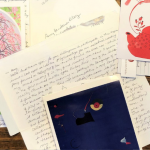Years ago, I painstakingly hand stitched tiny, brightly colored baby quilts for her first two children. She hung them on the wall of their shared room, their names emblazoned in bright yellow letters. I wasn’t there to see them: Years before, she had helped me to fill the U-Haul as I headed to graduate school down South to escape a quarter century spent in one place, and she moved further up North to be closer to family and begin life with her college love.
I meant to stitch that third blanket together. The pieces were already cut and placed in a plastic grocery bag, waiting to be placed on top of the soft, yellow fleece that backed the other two, finished, quilts hanging in her brothers’ rooms. But work called. And then the holidays approached. I’d send it once the baby was born. She’d understand.
We always said we couldn’t wait to sit on a porch together, old ladies rocking back and forth, chatting as our grandchildren played together in the yard. We were on some kind of cosmic wavelength; it was as if we were twinned without the biology. Best friends forever.
She learned she was pregnant with her third child, their first girl, when I was struggling with day care and working full-time and thinking about having another baby. I was thrilled for her, elated when they chose her name, Charlotte, and then, as she was nearing her third trimester, I found out I was expecting again. For the first time, when we called each other (never as often as we did before children, never as long, but always just when we needed to), we could discuss cravings and stretch marks and everything else we were going through. We were doing it together.
My phone buzzed after dinner one night, as our son played with the new toys Santa had left under the tree. One quick, bee-like buzz.
C is stillborn. Please give us some time. xo.
I don’t remember the words I strung together to tell my husband that a baby had died. That her baby had died. Her baby had died. I sat on the carpeted stairs of our townhouse staring at the screen of my phone. The message said everything, but it said nothing to me.
I called mutual friends to let them know, because I didn’t want her to have to face any more pain when “good luck” messages would surely start popping up on her Facebook wall as her due date approached. I cried on the couch holding my one-year-old, asking my husband how such a terrible thing could happen to such good people. Tears welled up in his eyes as he answered, I don’t know.
I talked to her sister-in-law through choked sobs, once they had left the hospital, and learned that she wasn’t feeling well the night before. And despite having a few caffeinated drinks — the regular go-to for pregnant moms who want to make sure that their babies start kicking when they get quiet — Charlotte didn’t move.
Related
I learned she went to the hospital and they couldn’t find a heartbeat. I learned they had to induce labor via an IV. I learned she was at least able to labor while heavily medicated.
I learned even if you know your baby is dead, you still have to deliver it anyway. You have to strain and push and moan and tear but you will never hear the cry of your child when it’s over.
I learned you can hold your baby at the hospital, swaddled in a blanket, and they will take photographs and footprints and give you every little memento as though you delivered a live birth, except you leave the hospital with empty arms, on the same elevator as people clutching balloons and baby carriers.
I learned you can pick your child’s cremains up a week later in a small, cardboard box, then try to figure out what you are going to do with a box containing a part of you. But in the meantime, you can leave it on the bookshelf until you find the urn that will perfectly memorialize that lost life.
I learned sometimes you will wake in the middle of the night screaming because you think you hear a baby crying, but what you are actually hearing is a gaping silence, louder than the mewled screeches of an infant hungry for milk.
I learned all of these things weeks and months later, when we were finally able to “speak” on the computer through instant message. I hadn’t picked the phone up, although I had emailed, even going so far as to designate Thursday the day I’d check-in, so as not to insert myself too much into the grieving process. I didn’t want to be the wave crashing down on her when she could finally pull her head above water, but I wanted, so desperately, for her to know I was there.
A couple weeks after Charlotte’s death, the ultrasound technician waved her wand over my belly and announced I was expecting a girl. I couldn’t think of a way to start the sentence, “I’m having a girl.” We hadn’t exchanged the intimacy of actual spoken words, fraught with the tremors of grief and the tears of anguish, because I was pregnant and she wasn’t and there was no way to speak that guilt I carried along with my child.
When my own daughter was born months later, my breath caught in my chest to hear that first cry. It was glorious, that baby wail, and I cried alongside with her, happy to hear my own daughter’s first decibels and devastated as the enormity of my dearest’s loss washed over me.
Since then, she’s welcomed another daughter, a wide-eyed little girl who was not a replacement for the life lost, but who certainly salved the pain of such profound loss.
We all sat on the beach recently I with my two, and she with her three, watching the bigger kids play in the surf and the little girls dig happily in the sand. My family now lived just 45 minutes away from hers, having recently relocated back up North, where the smell of the ocean was never more than a half an hour away. I surveyed the scene in front of us, and sighed aloud, exhaling into the salt air. It’s so peaceful here, she said, right? And I looked at her face, the lines of loss from those first couple of years starting to soften, and knew that peace, however slowly, was coming to her at last.
Megan Birch-McMichael is a writer raising two young children in rural Massachusetts along with her amazingly brilliant PhD of a husband. She loves to run incredibly long distances, knit intricate things for tiny humans, and write about her life experiences at anatomyofamother.tumblr.com. Her work has been published in The Homesteader.












